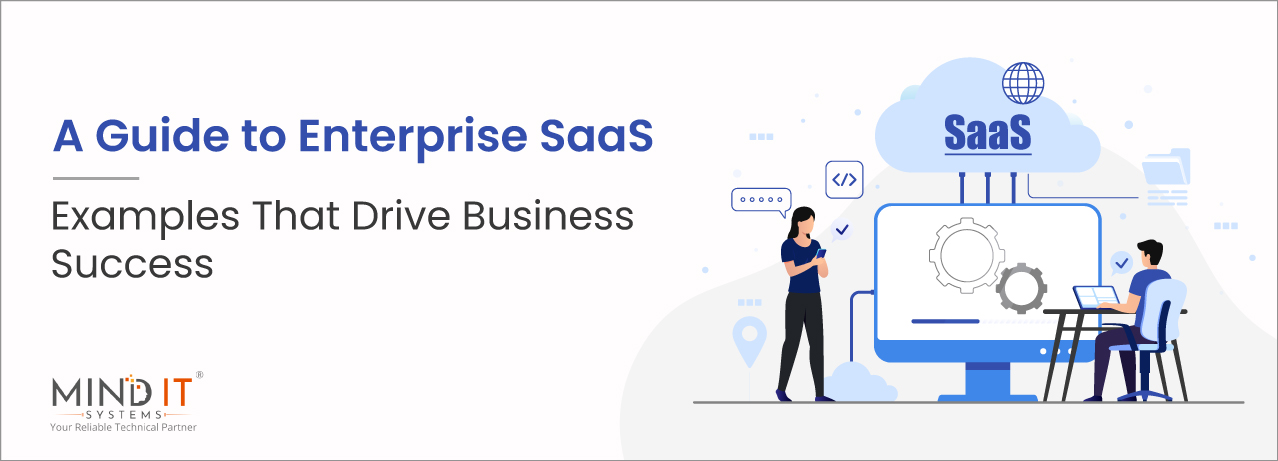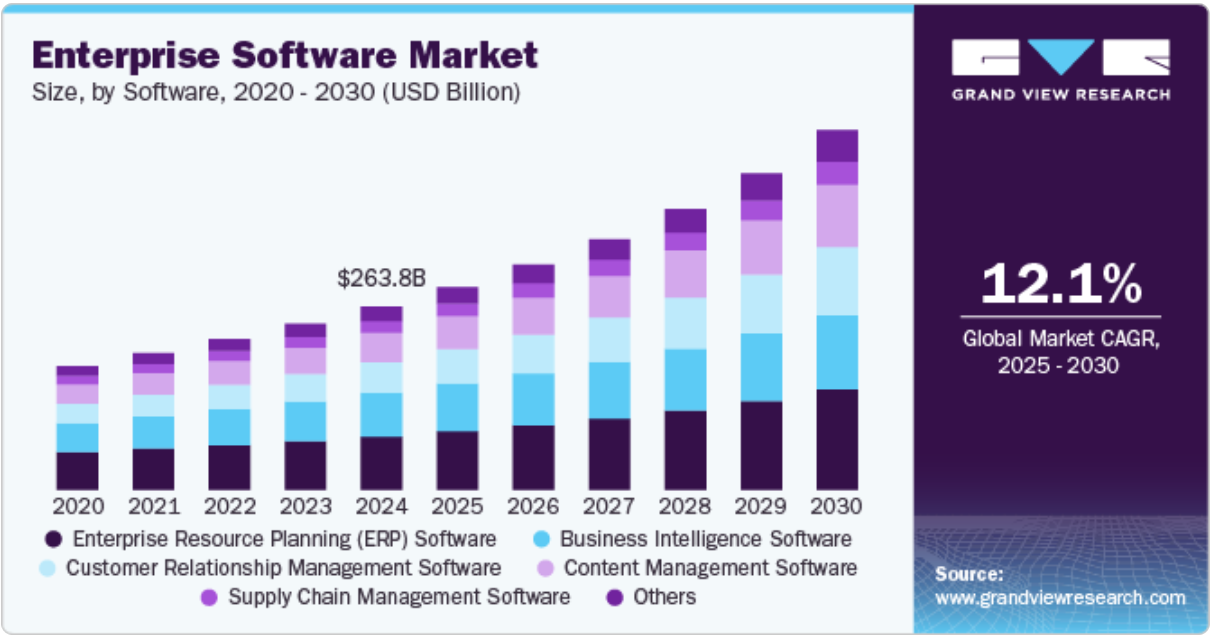
A Guide to Enterprise SaaS: Examples That Drive Business Success
Introduction
In the current digital landscape, Enterprise SAAS is the key to efficiency, growth, and staying ahead of the competition.
Whether you are a start-up or an established enterprise, running business operations seamlessly in today’s ever-changing digital world is troublesome. It is here: Enterprise software can provide practical solutions to daily business operational challenges.
The global enterprise IT market is expected to reach breathtaking figures. The graph below highlights the Enterprise Software Market Growth from 2020 to 2030.

Image Source: grandviewresearch
In such a scenario, opting for enterprise software as a service can open the door to innovation, growth, and sustainability for businesses.
The formula for today’s business success is simple: drive innovation through information technology—tech that can help you excel operationally.
If you want to drive your business growth, this comprehensive guide is for you.
In this guide, we will discuss about the enterprise SAAS management platforms, their examples, benefits, and more.
So, don’t miss it; be with us till the end to explore.
What We’ll Cover
What is Enterprise SaaS and Why Does it Matter?
In the modern business landscape, staying ahead means working smarter, not harder. Enterprise SaaS brings you the power of technology without the headaches of traditional software. Think of it as a ready-to-use toolkit in the cloud—accessible, affordable, and built to grow with your business.
No matter whether the concern is to automate time-consuming tasks or give you real-time data to make informed decisions, Enterprise SaaS is here to simplify your work and enhance your results. It’s more than a tool; it’s a reliable partner in your success journey.
Key Features of Enterprise SAAS Management Platforms
Before diving into the benefits of enterprise SaaS management platforms, get to know the key features that make Enterprise SaaS solutions indispensable. The right enterprise SaaS management platform combines advanced technology with practical solutions to tackle today’s business challenges.
The core features of Enterprise SAAS Platforms that make it stand out:
- High Availability: Downtime can cost agencies heavily. With excessive availability as a general characteristic, these platforms ensure that services are continually available. Built-in redundancies, failover systems, and disaster recovery mechanisms decrease disruptions, making sure continuous operations for critical tasks.
- Elastic Infrastructure: Scalability is vital for growing businesses. Enterprise SaaS management platforms offer an elastic infrastructure that adjusts sources dynamically based on demand. Whether it is a surge in site visitors or decreased usage, the platform optimizes performance and cost.
- Role-Based Access Control: Data protection begins with controlling access. The Enterprise SAAS platforms permit administrators to outline person roles and permissions, ensuring every crew member accesses what they need most effectively. This granular management prevents unauthorized entry and maintains touchy statistics that are blanketed.
- Multi-Tenancy Model: A multi-tenancy version enables multiple groups to secure equal infrastructure securely. By setting apart facts for every user, this feature optimizes aid utilization, simplifies improvements, and decreases operational fees while preserving privacy.
- Single Sign-On: Simplify authentication with single sign-on. SSO helps users to log in once and access multiple applications without juggling numerous passwords. This enhances user convenience, boosts productivity, and strengthens security.
- Automated Provision: Speed and performance are crucial for organizations. Automated provisioning streamlines the technique of putting in new users, packages, or features. This reduces manual effort, shortens onboarding times, and speeds up business operations.
- Audit Logs: Transparency is imperative for compliance and safety. Audit logs offer unique data of user activities, machine modifications, and information adjustments. These logs assist identify anomalies, ensure duty, and keep regulatory compliance.
- Data Security: Protecting commercial enterprise-critical records is non-negotiable. Enterprise SaaS control structures rent advanced encryption methods, stable facts transmission, and strong storage structures to guard touchy statistics. Regular backups and compliance with privacy standards add greater layers of protection.
- Application Security: Cyber threats are a steady problem. The Enterprise Saas platforms prioritize application security with secure APIs, everyday vulnerability assessments, and authentication protocols. Proactive measures keep systems resilient and equipped to handle emerging dangers.
- Subscription-Based Billing: Flexibility in pricing is a considerable benefit. Subscription-based billing techniques permit companies to pay for what they use. This eliminates hefty upfront fees, presents scalability, and offers transparency in coping with expenses.
Benefits of Enterprise SAAS Platforms for Business Growth
Businesses like yours often face serious challenges while streamlining operations, minimizing costs, or enhancing customer relationships.
Enterprise SAAS software management platforms can help tackle these challenges. Here’s the list of benefits Enterprise SaaS Software solutions offer:
- Streamlined Operations: Automates recurring processes, enhancing efficiency and lowering effort.
- Cost-Effectiveness: Subscription models lower capital fees, making superior gear on hand for businesses of all sizes.
- Enhanced Collaboration: Multi-tenancy and role-based access facilitate secure collaboration across teams and partners, boosting efficiency.
- Faster Time-to-Market: Automated provisioning and scalable infrastructure enable quick onboarding and deployment, accelerating venture timelines.
- Data-Driven Decision Making: Real-time analytics and consistent statistics storage give actionable insights for informed decision-making.
- Scalability and Flexibility: Elastic infrastructure and modular features permit agencies to evolve to market demands and scale results easily.
Top Enterprise SAAS Platforms Driving Business Success
Enterprise SaaS platforms are reshaping how businesses operate. These platforms deliver scalability, efficiency, and innovation, making them indispensable for enterprises aiming to thrive. Discover the top 7 examples of enterprise SaaS platforms driving real business success.
1. Salesforce:
- Offers CRM tools to manage customer relationships efficiently.
- Automates sales processes to boost productivity.
- Provides real-time analytics for informed decision-making.
2. Microsoft 365:
- Streamlines collaboration with tools like Teams and SharePoint.
- Enhances productivity through cloud-based document sharing.
- Integrates seamlessly with existing Microsoft products.
3. Slack:
- Simplifies team communication and project tracking.
- Integrates with other tools to centralize workflows.
- Enhances productivity through organized communication channels.
4. Zoom:
- Enables seamless video conferencing and virtual meetings.
- Supports collaboration with screen sharing and breakout rooms.
- Integrates with calendars for easier scheduling.
5. HubSpot:
- Renders tools for marketing, sales, and customer service.
- Provides analytics to measure campaign effectiveness.
- Automates repetitive tasks to improve efficiency.
6. Zendesk:
- Specializes in customer service management.
- Delivers exceptional support and engagement tools.
7. Adobe Experience Cloud:
- Digital marketing-focused platform.
- Personalizes experiences and optimizes campaigns.
Choosing the Right Enterprise Software Solutions for Your Needs
Now comes the major decision: Choosing the right enterprise software solutions for your business – always pick the enterprise software solution considering your business-specific needs and operational goals.
To brief, we have jotted down the things you should take note of:
- Define Objectives: Understand your priorities—whether it’s improving collaboration, enhancing security, or scaling operations.
- Evaluate Features: Look for key features like scalability, security, and user-friendly interfaces that align with your needs.
- Consider Budget: Assess the cost-benefit of subscription-based models to ensure affordability.
- Check Integrations: Choose platforms that integrate well with existing tools for seamless workflows.
- Read Case Studies: Learn from businesses with similar needs to gauge platform effectiveness.
The Future Trends in Enterprise Software as a Service
Enterprise Software as a Service (SaaS) must adapt as businesses evolve to meet new demands and solve emerging challenges. The future trends discussed here are on track to reshape the landscape of enterprise IT influencing the future trajectory of SaaS solutions.
1. AI-Powered Customization
Industries like retail demand hyper-personalization to meet customer expectations. AI-driven SaaS leverages real-time insights, enabling businesses to offer tailored experiences that enhance customer loyalty and increase sales.
2. Simplified Development with Low-Code Platforms
Time is a critical resource, especially in sectors like healthcare. Low-code and no-code SaaS solutions empower teams to build and deploy applications rapidly, bridging the gap between innovation and execution.
3. Niche SaaS for Specific Industries
Every industry faces its unique set of challenges. Vertical SaaS solutions cater to these, providing sector-specific tools that address pain points such as compliance in finance or logistics in manufacturing.
4. Security and Compliance as Core Features
With tightening regulations, security becomes a core focus. Industries like education and finance benefit from SaaS platforms that integrate robust encryption and compliance monitoring, ensuring data safety and legal adherence.
5. Edge Computing for Real-Time Needs
Businesses in manufacturing or logistics require instant insights. Edge computing-enabled SaaS processes data locally, providing real-time decision-making without delays, a critical factor for operational efficiency.
6. Seamless Multi-Cloud Integration
As enterprises increasingly rely on multiple cloud services, SaaS solutions ensure smooth integration across diverse ecosystems, fostering operational efficiency and collaboration.
7. Flexible Subscription Models
Modern businesses need scalable solutions. Consumption-based SaaS pricing offers flexibility, allowing companies to optimize costs while scaling services to meet their evolving needs.
The Bottom Line
With Enterprise SaaS, businesses can facilitate strategies, curtail costs, and work extra successfully. These platforms provide capabilities like AI personalization, easy improvement, and sturdy protection, assisting businesses to stay aggressive. Businesses can reap lengthy-time period boom and stay adaptable in a constantly changing marketplace through choosing the right SaaS solution.
Share this post
About the Author

Sujoy Roy
(Head – Digital Marketing)
From my teenage time, I had a quench to solve problems and loved leadership. Starting my career in relation management, ignited my passion for managing people. While managing I realized technology needs to be incorporated to keep pace with the changing world & do my work efficiently.

